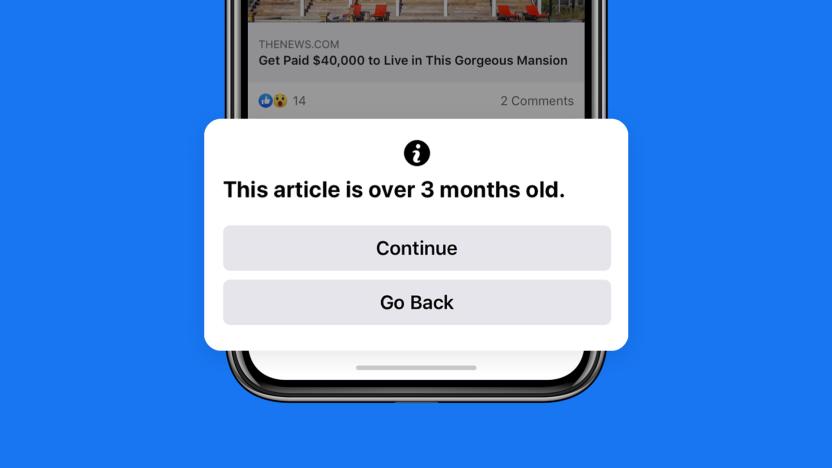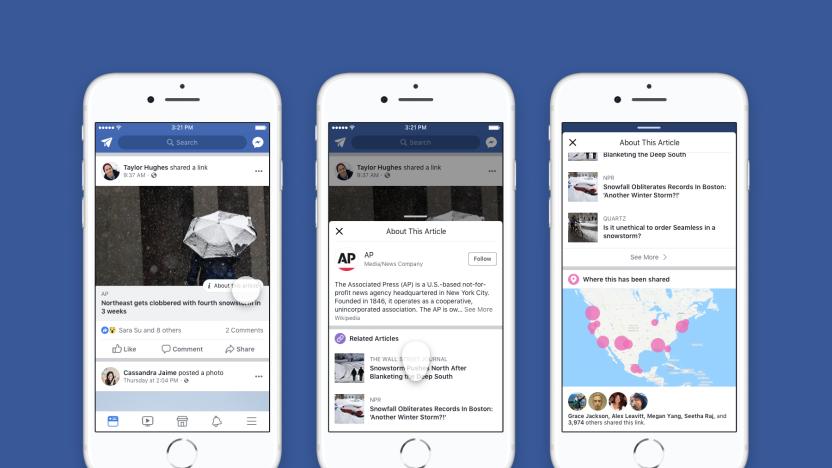context
Latest

Google brings more context to major news stories in Search
The Full Coverage feature has been available in Google News since 2018.

Facebook will tell you when you're about to share old news
You'll see a notification when you're linking to something more than 90 days old.

Researchers find Twitter is good for amplifying lies
When it comes to spreading President Trump's false and misleading remarks, Twitter is a perfect storm. A study by Media Matters found that when tweeting about Trump's statements, major news outlets include false information 30 percent of the time. And 65 percent of the time, news outlets fail to provide corrections or context in the body of those tweets. That's especially troublesome given that so many people get their news via tweets and headlines and do not fully read most stories, where they might find more context.

Twitter may label notable tweets that violate its terms
Twitter is considering a label for tweets that violate its rules but believes should remain on the platform because they're in the public interest. Twitter's head of legal, policy and trust Vijaya Gadde said in a Washington Post interview such a label could "put some context around [a tweet] so people are aware that that content is actually a violation of our rules and it is serving a particular purpose in remaining on the platform."

Google explains how it's fighting fake news
Like all online platforms, Google is not immune to the scourge of fake news that has dominated headlines over the last few years. The company has taken various steps in fighting the problem -- from partnering with fact-checking networks to launching the $300 million Google News Initiative. Now it's expanded its transparency efforts further by detailing at length the steps it takes to fight disinformation across its services.

Facebook rolls out news verification tools to everyone in the US
Facebook has been fighting fake news for a while now, ranking "trusted" sources and demoting "engagement bait" stories. Last October, the company began testing a feature that provided information on article publishers to help people decide which sources were worth reading, trusting and sharing. Now the company is set to roll this out to everyone in the US, along with two more options to give you more context when you see a story in your news feed.

Snapchat just made tagging places a lot more useful
More and more places are getting their own Snapchat location filters, but what good are they? Well, now they link to further information about where your pals are sending evaporating updates from. The ephemeral photo app is calling them Context Cards. The video filled with very attractive twentysomethings below shows restaurant reviews from TripAdvisor, destination info for driving your own car or taking Lyft or Uber and will add your location to a map, Foursquare style. It looks like you can even make hotel reservations without leaving Snapchat, too -- all based on the location filter you pick.

Android apps will know when you need them and open automatically
That slab of plastic and glass in your pocket might be called a smartphone, but Google is hoping to make the applications running on it smarter yet. The folks in Mountain View hope to achieve that by giving them access to contextual data like time of day, where you are, what you're doing, the weather and if you have headphones plugged in. Oh, and if there are any Physical Web devices (beacons) near by. A post on the Google Developers blog says that combining the aforementioned data would allow an app to, say, suggest a playlist when you plug in headphones and go for a run.

NC State develops personalized web search without the usual server strain
The notion of personalized, contextually aware search is nothing new, but it can put a tremendous strain on servers by asking for a lot of data at once. NC State has developed a search technique that could ease that burden. Its code prioritizes results based solely on the "ambient query context," or the concepts related to a person's recent search history. Look for politicians, for example, and a search for Ford is more likely to bring up Gerald Ford than the car company. By focusing on just a fraction of a user's search habits, the university can customize results using far fewer processor cycles: while a test server could only handle 17 active searchers with an old approach, it can manage 2,900 with the new method. The query engine won't be confined to the lab, either. NC State tells us that a community-driven search beta is due within several months, and there are plans to commercialize the technology in the long run.

The Nexus Telegraph: Respecting the NDA on WildStar's beta
Carbine Studios is holding all of the cards for WildStar and those of us not in the beta just have to wait. Which is beyond frustrating. We have to sit back and let things slowly come out of the official PR machine, and no matter how fast we get new revelations, they're never fast enough. The temptation to look for someone willing to peel back the veil is immense because it beats pressing against the glass and waiting to find out more. But the NDA is there for a reason. Speaking as someone who isn't in the beta but is still talking about the game on a weekly basis, I will be the first to point out that waiting for official information is often like waiting for a solar eclipse before doing even the most basic tasks. It's frustrating, slow, and irritating. The problem is that the alternative -- wherein we just jump on every new piece of leaked information -- isn't good, and it comes out worse in the end.

A Mild-Mannered Reporter: What makes a superhero game?
If I want, I can play the same character in Champions Online that I play in Star Wars: The Old Republic. Pick one, any one will work. I can also recreate my Shaman from World of Warcraft, my Dervish from Guild Wars, or my captain from Star Trek Online. And I don't mean that I can just recreate them within a fair margin of mechanical error; I mean that I can straight up cop the same origin story and everything. That being said, the characters in their original settings are not superheroes. That brings us to an interesting situation. Superheroes are in no small part defined by their abilities, but in another setting, those abilities are in no way out of the ordinary. So it's interesting to try to define what makes one game with mages and robots and supernaturally skilled swordsmen a superhero game while another one isn't.

Microsoft patents contextual ads in e-books, whether we like it or not
We have ad-supported e-reading today, but the ads always sit on the periphery at most. That makes us more than slightly nervous about a newly-granted Microsoft patent for contextual e-book ads. The development would make the pitch based on not just targeted pages but the nature of the book in question: a sci-fi novel might try to sell lightsabers, and characters themselves might slip into the ads themselves if there's a fit. Promos could be either generated on the spot or remain static. Before anyone mourns the end of unspoiled literature, just remember that having a patent isn't the same as using it -- Microsoft doesn't have its own dedicated reading app anymore, let alone any warning signs that it's about to pepper our digital libraries with marketing. If the Newco partnership results in copies of War and Peace bombarded with Black Ops II ads, though, we'll know where to place the blame.

Storyboard: From beyond the boundaries
Every game world has a basic setting premise. Your character in Guild Wars can come from all over Tyria, but he certainly doesn't come from Alderaan. Even though your captain in Star Trek Online is proficient in unarmed combat, she cannot bend the Matrix to her will. And no matter how similar the settings might seem, when WildStar finally comes out, you will not be able to claim that your character used to smuggle cargo on a Firefly-class vessel out in the black. People do these things anyway. People gleefully import characters wholesale from other settings and expect it to be accepted that they come from another time and place, often bringing with them plenty of baggage. It's flagrant disregard for the rules of the setting and the game as it exists, and it's a hallmark of bad roleplaying... And yet it doesn't have to be. This is an element of fiction that's always been very popular, and in some games (such as most superheroic ones), the idea of slipping from one world to another doesn't seem that far-fetched. So let's talk about why it tends to be done and how you can actually do this without being obnoxious.

TUAW's Daily Mac App: DTerm
The Terminal is a Mac power-user's best friend. When you need to get something specific done, access the underlying system, modify files or change some settings, command line is often the best and only way to get it done. Instead of having to go to it, DTerm brings the command line to you. Working in the command line normally means stepping out of your current workflow and stepping into Terminal. Although it can affect anything on the system, and helps you get the job done, it's a very separate process. DTerm, which we covered back in 2008, makes Terminal access context-sensitive. From anywhere in any program you can invoke DTerm using a user-configurable global hotkey, from there you can run commands on the files you're currently working with. No need to manually go through and navigate to the correct file directory, DTerm takes your command line session right there, already set to your current working directory. You can even insert the currently selected documents directly into the command line making it quick and easy. You can run your commands as you normally would, right from the floating DTerm window and even copy them straight out of the prompt. Once you're done you can just hit escape, use the hotkey combo again or simply ignore DTerm and it'll automatically fade out. DTerm brings the command line to you, integrating it more effectively and quickly into your work flow. It's a free download from the Mac App Store and is compatible with Lion. If you ever find yourself in Terminal as part of your workflow, give DTerm a whirl and see whether it speeds up your command line sessions.

WebGL flaw leaves GPU exposed to hackers
Google spent a lot of time yesterday talking up WebGL, but UK security firm Context seems to think users should disable the feature because it poses a serious security threat, and the US Computer Emergency Readiness Team (CERT) is encouraging people to heed that advice. According to Context, a malicious site could pass code directly to a computer's GPU and trigger a denial of service attack or simply crash the machine. Ne'er-do-wells could also use WebGL and the Canvas element to pull image data from another domain, which could then be used as part of a more elaborate attack. Khronos, the group that organizes the standard, responded by pointing out that there is an extension available to graphics card manufacturers that can detect and protect against DoS attacks, but it did little to satisfy Context -- the firm argues that inherent flaws in the design of WebGL make it very difficult to secure. Now, we're far from experts on the intricacies of low-level hardware security but, for the moment at least, there seems to be little reason for the average user to panic. There's even a good chance that you're not vulnerable at all since WebGL won't run on many Intel and ATI graphics chips (you can check by clicking here). If you're inclined to err on the side of caution you can find instructions for disabling WebGL at the more coverage link -- but come on, living on the cutting edge wouldn't be anywhere near as fun if it didn't involve a bit of danger. [Thanks, Tony]

Plug In Launcher for Android makes things happen when you connect USB or headphones
Plug In Launcher is a free Android app that does just one thing, and it does it well -- it launches any app of your choice when it detects power or a connected pair of headphones. In fact, it can pair one app to your phone's 3.5mm headphone jack and another to your USB port, letting it launch, say, a music player when you plug in headphones, and perhaps an alarm clock while you're charging it overnight, saving you a button press (note: the "Would you like to launch" message is optional) each time. All it asks in return is a pair of running processes that eat up 5.7MB of memory (as of this writing) and the ability to restart itself when you reset your phone. Sure, the app's a little limited compared to context-aware suites like Locale or Nokia Situations, but free is free, and this one's useful.

Nokia toys with context-aware smartphone settings switch, Jigsaw provides better context for apps like this
If Intel prognosticated correctly, context is the future of apps -- your device's array of sensors will determine where you are and what you're doing, and clever programs will guess from there. Problems arise, however, when one tries to run those accelerometers, microphones, radio antennas and GPS tracking devices constantly on the battery life of an average smartphone and determine what the raw data means, and that's where a group of Dartmouth researchers (and one Nokia scholar) are trying to stake their claim. They've got a bundle of algorithms called Jigsaw for iPhone and Symbian that claims to be able to continually report what you're up to (whether walking, running, cycling or driving) no matter where you place your device, and only pings the sensors as needed based on how active you are. (For better or for worse, Jigsaw also dodges the privacy concerns Intel's cloud-based API might raise by storing all personal data on the phone.) Of course, we've had a very basic version of context-aware functionality for years in apps like Locale for Android and GPS-Action for Symbian -- which modifies your smartphone settings under very specific conditions you specify. Now, Espoo's doing much the same with an app called Nokia Situations. Presently in the experimental stage, Situations is a long ways away from the potential of frameworks like Jigsaw, but here you won't have to wait -- you can download a beta for Symbian^3, S60 5th Edition and S60 3.2 at our source links without further delay.

Cataclysm beta guild contest
Want to get into the beta and don't know how? Well, here's a chance for you and nine of your guild members to make it in. Blizzard is asking for players to send in a short essay on why their guild should be accepted into the beta and what they'll do to push the new Cataclysm systems to the brink. You'll be able to play with and give feedback on the new guild leveling system, updated professions, the new archaeology system and even run the worgen and goblin starting zones. They'll be picking 100 contestants each week over the course of five weeks. Check the contest rules and then send your essay to blizzardcontest@blizzard.com to enter. World of Warcraft: Cataclysm will destroy Azeroth as we know it. Nothing will be the same. In WoW.com's Guide to Cataclysm, you can find out everything you need to know about WoW's third expansion. From goblins and worgens to mastery and guild changes, it's all there for your cataclysmic enjoyment.

The NBA playoffs, presented by World of Warcraft
This isn't exactly shocking news (this just in: Blizzard has an advertising budget!) but it is worth noting: Mark C. was watching the NBA playoffs the other day and lo and behold, guess which familiar logo appeared during a halftime sponsorship. Apparently the announcer even read off the name of the game during a tag. I don't think Mark is exactly right about it being one of the "first non-sports games being advertised in a sporting event" (I'm pretty sure I've seen one of those Killzone 2 or Call of Duty spots during my Cubs games lately), but it's the first time we've seen WoW promoted outside of the usual TV spots.It's interesting to note, too, that it's being presented during the NBA playoffs as well -- I've seen more WoW twitterers tweet about the hockey playoffs lately than the basketball equivalent. Then again, Mark also says he saw it on the NBA TV subscription service, so maybe it was targeted at people who are willing to subscribe to a digital service. And just for the heck of it, we'll also point out that it was an LA (Blizzard is in Anaheim) vs. Houston (Blizzard also has an HQ in Austin) game, so maybe it was geographically targeted as well.But this will probably not be the last time you see WoW in this context. Keep those eyes open.

Sensor vest promises to affirm that we're always stressed out
So maybe your stress level isn't sky high just yet, but even after an extended weekend, all it takes is that one email to get you right back where you were last Wednesday. As if you really needed something to tell you that (and if you don't have time to wait for Sweety to become a reality), a host of researchers have created a sensor-laden vest that will be able to inform wearers just how stressed they are. Developed as part of the EU's CONTEXT project, this sure-to-be-hip vest packs ultra-sensitive electrodes which register changes in muscle tension as individuals get more and more stressed, and in theory, letting someone know what's happening will allow them to simmer down before they further jeopardize their health (and the livelihood of colleagues, if you dig). Eh, we still prefer the Dr. Whippy method, honestly.[Via Talk2MyShirt, thanks Tony]









